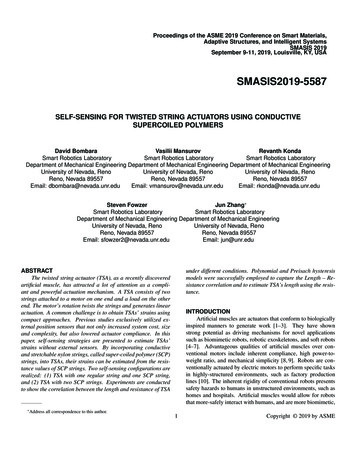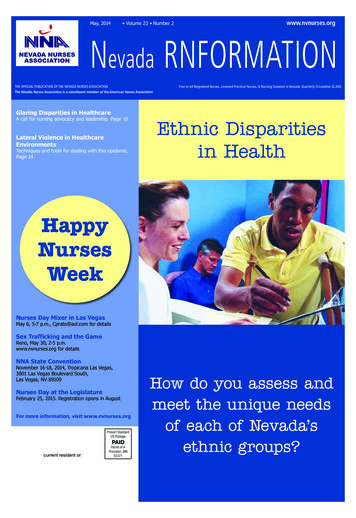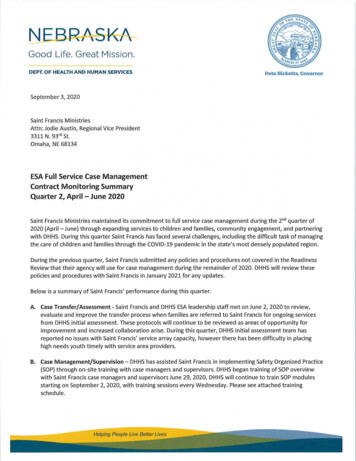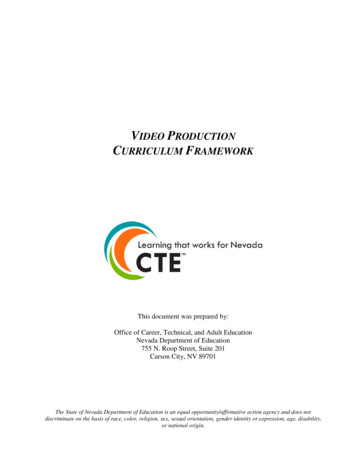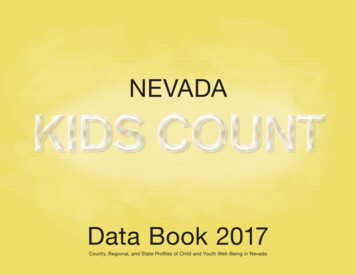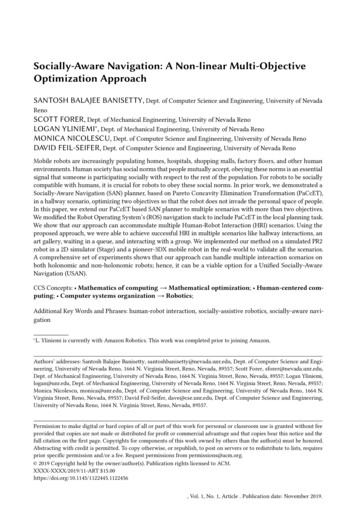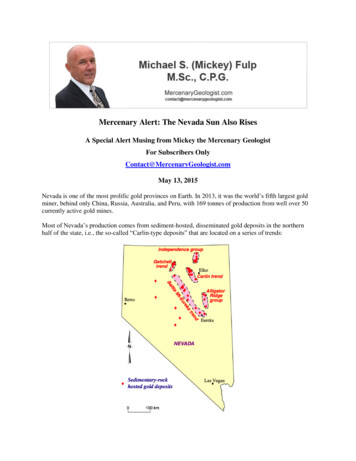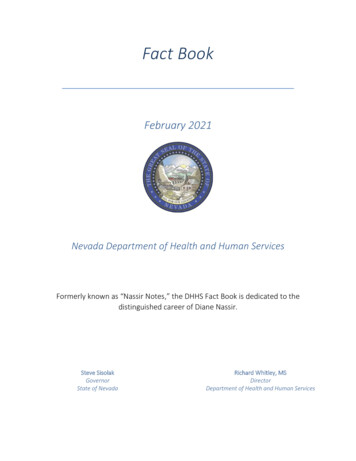
Transcription
Fact BookFebruary 2021Nevada Department of Health and Human ServicesFormerly known as “Nassir Notes,” the DHHS Fact Book is dedicated to thedistinguished career of Diane Nassir.Steve SisolakGovernorState of NevadaRichard Whitley, MSDirectorDepartment of Health and Human Services
Table of ContentsDirector’s Office . 3Aging and Disability Services Division . 9Division of Child and Family Services . 18Division of Health Care Financing and Policy . 26Division of Public and Behavioral Health . 42Division of Welfare and Supportive Services . 622 Page
Nevada Department of Health and Human ServicesDirector’s OfficeMISSION STATEMENTThe Nevada Department of Health and Human Services (DHHS) promotes the health and well-being ofNevadans through the delivery or facilitation of essential services to ensure families are strengthened,public health is protected, and individuals achieve their highest level of self-sufficiency.Enabling Statute NRS 232.290REVENUE AND GENERAL FUND INFORMATIONLegislative Approved 2020-2021 BienniumGeneral Fund: 2,967,172,105Federal: 7,729,215,841Other: 1,808,107,579Total overall budget: 12,504,495,435Governor Recommended 2022-2023 BienniumGeneral Fund: 3,253,021,833Federal: 8,550,639,232Other: 3,389,545,184Total overall recommended budget: 15,193,206,2493 Page
ORGANIZATIONAL CHARTGovernorDirector, Department of Health and Human ServicesAging entalServicesEarlyInterventionServices (0-3years)Adult ProtectiveServicesFamilyPreservationProgramSenior andDisability RxProgramTaxi AssistanceProgramDivision ofChild andFamilyServices(DCFS)oooooooooChild WelfareOversight inClarkChildren’sMental HealthProgramEvaluation UnitChildren’sMobile CrisisResponse TeamClinicalChildren’sMental HealthEarly Children’sMental HealthJuvenile JusticePrograms OfficeYouth ParoleBureauSummit ViewYouth CenterDesert WillowTreatmentCenterDivision ofHealth CareFinancing andPolicy (DHCFP)oooooCertifiedCommunityBehavioral HealthClinicDemonstrationProjectMedicaidNevada Check UpSpecialized FosterCare 1115DemonstrationWaiver1915(i) State PlanOption forSupportive HousingServicesDivision ofPublic andBehavioralHealth (DPBH)ooooooooChronic DiseasePreventionCommunityHealth WorkerMaternal, Childand AdolescentHealthOffice of FoodSecurityTeen PregnancyPreventionTobaccoPrevention sDivision ofWelfare andSupportiveServices (DWSS)ooooooAsset Verificationwith FinancialInstitutionsChild SupportEnforcementKinship CareSocial amTemporaryAssistance forNeedy Families4 Page
DIRECTOR’S OFFICE PROGRAMSNevada 211Established by Executive Order in February 2006, Nevada 2-1-1 was created to implement a multi-tieredresponse and information plan in the State of Nevada. 211 is a telephone number reserved in the UnitedStates and Canada to provide information and referrals to health, human and social service organizations.Dialing 211 in almost every part of the United States will connect individuals to essential human and socialservices near them.Nevada 211 referrals include places to find emergency food; housing and emergency shelter locations;children’s services; health care; support for seniors, older persons, and individuals with disabilities; mentalhealth and counseling services; support for community crisis and disaster recovery; and employmentservices.Nevada 211 is available 24 hours per day, seven days per week via telephone, website, text, chat, email andsocial media. Additionally, the Nevada 211 app is now available in the Apple App Store and Google Play.Information can be searched based on location and individuals can find program information and connectdirectly to a Nevada 211 Call Specialist. The Nevada 211 program is administered by Money ManagementInternational.For more information, please ts.orgwww.nevada211.org/reports/Enabling Statute NRS 232.359Office of AnalyticsThe Office of Analytics provides DHHS staff, media, legislators and the public a consistent location torequest data to support grant funding, drive policy, and inform the public. Under the technical guidanceof the Chief Biostatistician, the Office of Analytics is made up of staff from each DHHS division and focuseson utilizing coordinated and advanced cross-divisional analytics to drive policy and decision making acrossthe Department of Health and Human Services. Centralization of a cross-divisional team enableddepartment-wide improvements of the consistency and quality of analytic products being produced anddisseminated while allowing staff to the Office of Analytics the opportunity for peer-to-peer developmentand capacity building through a skilled analytic workforce.DHHS' data request system OTRS is a key element for the Office of Analytics to support initiatives and staff.This system, piloted in mid-2017, allowed a triage team to daily review all incoming health data requestsfor completeness and authority, and assigned them to the proper data analyst for completion. The requestsare tracked from receipt to delivery. An archival process is in place to allow for duplicate/similar requests5 Page
to be produced using the same methodology for consistency. This process has greatly improved the qualityand response time for health-related data requests.For more information, please visit:http://dhhs.nv.gov/Programs/Office of Analytics/DHHS Office of Analytics/Office for Consumer Health Assistance (OCHA)Established by the Nevada Legislature in 1999, the Office for Consumer Health Assistance (OCHA) is a vitalpoint of contact for health care consumers and providers in Nevada. OCHA’s mission is to provide theopportunity for all Nevadans to access information regarding patient rights and responsibilities, advocatefor and educate consumers and injured workers concerning their rights and responsibilities under varioushealth care plans and policies.OCHA provides education and advocacy to those who have insurance through an employer, managed care,individual health policies, Employee Retirement Income Security Act (ERISA), Nevada’s Workers’Compensation, Medicare or Medicaid. Access to health care resource assistance is also provided to theuninsured and underinsured. OCHA provides arbitrations to resolve disputes between out-of-networkproviders and third parties involving claims of less than 5,000 for medically-necessary emergency services.OCHA collaborates routinely with non-profit organizations, state and federal agencies. OCHA serves as anumbrella agency for multiple consumer health related programs, including: Bureau for Hospital Patients,Worker’s Compensation Injured Workers Assistance, External Review Organizations, Medicare or Medicaid.OCHA also has two contract Exchange Enrollment facilitators (Navigators) funded by a grant from theNevada Silver State Health Insurance Exchange to assist consumers with applying for health insurancecoverage through the Exchange.For more information, please visit:http://dhhs.nv.gov/Programs/CHAEnabling Statute NRS 232.451- NRS 232.462NRS 695G.241-NRS 695G.310NRS 439B.700-NRS 439B.760Grants Management Unit (GMU)The Grants Management Unit (GMU) is housed within the Department of Health and Human Services.Originally created to administer grants to local, regional, and statewide programs serving Nevadans, theUnit has matured to include program development as one of its principal roles. The Unit builds and supportsnetworks that help families and individuals assess their needs and work toward holistic solutions and sharesresponsibility for program accountability, growth and success with its community partners.6 Page
Community Service Block Grant (CSBG) promotes self-sufficiency, family stability, and communityrevitalization.Family Resource Centers (FRC) provide information and referral services, and various supportservices to families.Fund for a Healthy Nevada (FHN) grants (1) improve the health and well-being of Nevada residentsincluding programs that improve health services for children and (2) improve the health and wellbeing of persons with disabilities.Social Services Block Grant (SSBG-TXX) assists persons in achieving or maintaining self-sufficiencyand/or supports child abuse prevention program efforts.The Trust Fund for Grief Support provides support to organizations to delivery peer support groupsfor children that have experienced a death in their family, as well as for families that haveexperienced a death of child.The Contingency Account for Victims of Human Trafficking was created by the 2013 Legislature andrevised by the 2015 Legislature. Funding may be awarded in a competitive grant process or throughan emergency fund to provide direct victim assistance in crisis situations. There is a policy and arequest form available for community agencies to request funds on the GMU website.Most GMU funding sources target at-risk populations. CSBG funds Community Action Agencies that areable to provide services to individuals and families at or below 200% of the Federal Poverty Level. TheFamily Resource Center Network (FRC) must conduct outreach to at-risk populations and provide resourcesand referrals to other assistance programs as well parent education and crisis intervention.For more information, please e of Minority Health and Equity (NOMHE)The Office of Minority Health was originally established during the 2005 Legislative Session. Per the statute,an Advisory Committee composed of nine (9) members reflecting the ethnic and geographical diversity ofthe state assists and advises the Office in carrying out its duties. As of August 31, 2015, the Office ceasedofficial operation due to lack of funding. During the 2017 Legislative Session, Assembly Bill 141 becameeffective, modifying the agency name to the Nevada Office of Minority Health and Equity (NOMHE) andmoving it under the Office of the Director of the Department of Health and Human Services. In addition toethnic and racial minorities, it now advocates on behalf of the Lesbian Gay Bisexual TransgenderedQueer/Questioning (LGBTQ) community and persons who identify as differently abled. Recognizing thesesub populations as marginalized, NOMHE includes them in its efforts to systemically embed equitablehealth considerations during state-level policy formation and among programmatic considerations ofagencies addressing issue areas that have a determining impact on health.To achieve its commitment to embedding equitable protocols and provide options for related ally-focusedtraining, NOMHE has partnered with the University of Nevada, Reno, School of Community Health’s PublicHealth Training Center. Resulting Health in All Policy (HiAP) and Cultural Competency training moduleswhich can be found at https://www.makinghealthhappen.org/.For more information, please visit:http://dhhs.nv.gov/Programs/CHA/MH/7 Page
Enabling Statute NRS 232.474Department Links Department of Health and Human Serviceso Department of Health and Human Services Fact Book Data Aging and Disability Services Division Division of Child and Family Services Division of Health Care Financing and Policy Division of Public and Behavioral Health Division of Welfare and Supportive Services Nevada COVID-19 Dashboard Nevada COVID-19 Facilities Dashboard8 Page
Nevada Department of Health and Human ServicesAging and Disability Services DivisionVISIONNevadans, regardless of age or ability will enjoy a meaningful life led with dignity and self- determination.MISSION STATEMENTThe mission of ADSD is to ensure the provision of effective supports and services to meet the needs ofindividuals and families, helping them lead independent, meaningful and dignified lives.PHILOSOPHYADSD seeks to understand and respond to the individual and his/her needs using principles of: AccessibilityAccountabilityCulturally and linguistically appropriate servicesEthicsMutual respectTimelinessTransparencyREVENUE AND GENERAL FUND INFORMATIONThe ADSD budget is comprised of federal funds, state general funds, and other funds as outlined in moredetail on our website. Many of our programs are required under state or federal law to comply withprovisions of the Olmstead decision and the Americans with Disabilities Act Integration Mandate.Legislative Approved 2020-2021 BienniumGeneral Fund: 392,335,686Federal: 36,016,313Other: 324,573,313Total overall budget: 752,924,312Governor Recommended 2022-2023 BienniumGeneral Fund: 414,712,438Federal: 39,012,511Other: 331,393,969Total overall recommended budget: 785,118,9189 Page
AGING AND DISABILITY SERVICES DIVISION PROGRAMSAdult Protective Services (APS)Nevada Revised Statutes mandates that Aging and Disability Services Division receive and investigatereports of abuse, neglect, exploitation, isolation and abandonment of vulnerable persons age 18-59, inaddition to persons 60 years and older, collectively referred to as vulnerable adults.The Adult Protective Services (APS) program utilizes licensed social workers and adult rights specialists toassist vulnerable adults by investigating, providing or arranging for services to alleviate and prevent furthermaltreatment while safeguarding their civil liberties. The services provided include, but are not limited to,emergency food, emergency placement assistance and capacity assessments by a licensed geriatricpsychiatrist. APS also make referrals to forensic medical and financial specialists, Bureau Health Care andQuality Compliance, Long Term Care Ombudsman and Community Base Care.The investigation commences within three working days of the report. APS may contact local lawenforcement or emergency responders for situations needing immediate intervention. APS refers caseswhere a crime may have been committed to law enforcement agencies for criminal investigation andpossible prosecution.For more information, please visit:http://adsd.nv.gov/Programs/Seniors/EPS/EPS Proghttps://www.nevada211.org/aps/Enabling Statute NRS 200.5093Attorney for the Rights of Older Persons and Persons with a Physical Disability, an IntellectualDisability or a Related ConditionThe Office of Attorney for the Rights of Older Persons and Persons with a Physical Disability, an IntellectualDisability, or a Related Condition was established in 1989 under NRS 427A.123. The role is an appointedposition by the Governor. In 2017, the Nevada Legislature broadened the scope of the position to includeall persons served by the Aging and Disability Services Division. The Attorney works to advance systemicimprovement throughout the aging and disability services network through legal advocacy and policyadvocacy so that Nevadans can live independent, meaningful and dignified lives. In addition, the office actsas the designated Legal Assistance Developer under the Older Americans Act. 42 U.S.C. § 3058j.Enabling Statute NRS 427AAutism Treatment Assistance Program (ATAP)The Autism Treatment Assistance Program helps families of children ages 0 through 19, with AutismSpectrum Disorders, to fund evidence - based therapy programs. Funds are used to pay clinicalprofessionals who design the therapy programs and train registered behavior technicians to deliver the10 P a g e
therapy. Applicants are prioritized based upon a variety factors relating to their need and opportunities forsuccessful therapy.For more information, please /Enabling Statute NRS 427A.875Community Options Program for the Elderly (COPE)The Community Options Program for the Elderly provides services to seniors to help them maintainindependence in their own homes as an alternative to a long-term care facility. COPE services include thefollowing non-medical services: Case Management, Homemaker, Social Adult Day Care, Adult Companion,Attendant Care, Personal Emergency Response System, Chore and Respite. Applicants must be 65 years orolder; financially eligible (for 2020 income up to 3,302.96; assets below 10,000 for an individual and 30,000 for a couple); and be at risk of long-term care facility placement within 30 days without servicesto keep them in their home and community. Priority given to those with difficulties completing Activitiesof Daily Living (ADLs) without assistance.For more information, please E Prog/Enabling Statute NRS 427A.250 NAC 427ACommunity Advocate Program (formerly known as Advocate for Elders)The Community Advocate Program provides advocacy and assistance to older adults (over 60), people withdisabilities and their family members. Services include information and referral, emergency assistance, andoutreach. The Community Advocate program was previously the 'Advocate for Elders' program. The namechange went into effect September 1, 2017 due to changes made to NRS 427A.300 expanding the scope ofservices to people with disabilities.For more information, please Elders/AdvocateForElders/Enabling Statute NRS 427A.300Developmental ServicesDevelopmental Services provides a full array of community-based services for people with Intellectual andDevelopmental Disabilities and their families in Nevada. The goal of coordinated services is to assist personsin achieving maximum independence and self-direction. All individuals who meet Developmental Serviceseligibility requirements of Intellectual Disability diagnosis or Developmental Disabilities and three of sixmajor life skill limitations who apply for services receive basic service coordination. Developmental Servicesagencies provide many services to Medicaid eligible clients. Provider based services are given under a11 P a g e
Medicaid waiver depending on the level of care the individual needs. Direct medical services are providedunder the Medicaid State Plan. Service coordinators assist individuals and families in developing a personcentered life plan focused on individual needs and preferences for the future. They also assist people inselecting and obtaining services and funding to achieve personal goals, community integration andindependence. Major programs provided to achieve these goals include Community based residentialsupports, Jobs & Day Training Supports and Family Supports.For more information, please ellectual/Enabling Statute 42 U.S. Code § 15001 NRS 435Assistive Technology for Independent LivingThe Assistive Technology for Independent Living Program (AT/IL) provides statewide services to supportindividuals with disabilities to live in their community vs. an institutional setting. The program is open toanyone whose permanent disability causes a substantial functional limitation with reasonable expectationthat the services will enable the individual to gain, improve, and maintain their independence and live intheir community. Individuals that are currently in a care facility, or at high risk of placement in a facility, canbe prioritized for the services that are necessary for them to live independently in the community.For more information, please /ATforILEnabling Statute NRS 427A.7953Communication Access Service CentersThe Communication Access Service Centers Program provides telecommunication devices and assistivetechnology distribution, repair and training; language acquisition; information and assistance to increaseaccess to services by information or referral to programs for employment, health, social services, andeducation for people who are Deaf, Hard of Hearing, or have a speech disability.For more information, please ssSvc/CAS/Enabling Statute NRS 427A.797Home and Community Based Services (HCBS) Waiver for the Frail ElderlyThe State of Nevada Home and Community Based Services (HCBS) Waiver for the Frail Elderly (FE)authorizes services to seniors to help them maintain independence in their own homes and communitiesas an alternative to long-term care facility placement. HCBS FE Waiver services include the following: CaseManagement, Homemaker, Social Adult Day Care, Adult Companion, Personal Emergency Response12 P a g e
System, Chore, Respite, Augmented Personal Care provided in residential care settings and access to StatePlan Personal Care Services.For more information, please visit:http://adsd.nv.gov/Programs/Seniors/HCBS (FE)/HCBS (FE)/Enabling Statute NRS 426 NRS 427A NRS 422 NRS 449Home and Community Based Services (HCBS) Waiver for Persons with Physical DisabilitiesThe State of Nevada Home and Community Based Services (HCBS) Waiver for Persons with PhysicalDisabilities (PD) authorizes services to individuals who have been diagnosed with a physical disability, tohelp them maintain independence in their own homes and communities as an alternative to long-term carefacility placement. HCBS PD Waiver services include the following: Case Management, Attendant Care,Homemaker, Chore, Respite, Assisted Residential Care, Environmental Accessibility Adaptations,Specialized Medical Equipment/Supplies, Personal Emergency Response System (PERS), Home DeliveredMeals and access to State Plan Personal Care Services.For more information, please visit:http://adsd.nv.gov/Programs/Seniors/PD Waiver/Waiver for Person’s with Physical Disabilities (PD)/Enabling Statute NRS 427AHomemaker ProgramThe Aging and Disability Services Division (ADSD) Homemaker Program provides in-home supportiveservices for seniors and persons with disabilities who require assistance with Instrumental Activities of DailyLiving (IADL) including light housekeeping, shopping, meal preparation and laundry, to prevent or delayplacement in a long-term care facility.For more information, please rProg/HomemakerProgramEnabling Statute NRS 426 NRS 427A.250 NRS 449Independent Living Grants ProgramThe Nevada State Legislature passed legislation in 1999, which enacted the Governor's plan for utilizingpart of Nevada's proceeds from the Master Tobacco Settlement to support "independent living" forNevada’s older adults (NRS 439.620). This program funds several vital services, such as respite care,transportation and supportive services. Supportive services include adult day care; caregiver supportservices; companion services; homemaker services; home safety, maintenance and repair services; and13 P a g e
Personal Emergency Response System (PERS). ILG funding is also used as match on federal discretionarygrant programs for the division. Nevadans age 60 or older, who need assistance to live independently. Also,respite care or relief of informal caretakers, including, without limitation, informal caretakers of any personwith Alzheimer’s disease or other related dementia regardless of the age of that person.For more information, please vicePrograms.pdfEnabling Statute NRS 439.630Long Term Care Ombudsman Program (Adult Rights Specialists)The Long-Term Care (LTC) Ombudsman program is authorized by the federal Older American’s Act. The Actrequires a statewide Ombudsman program investigate and resolve complaints made by or on behalf ofindividuals residing in long term care facilities. The Act also requires numerous activities related to thepromotion of quality care in LTC facilities. Adult Rights Specialists, also known as Ombudsman, provideresidents with regular and timely access to Ombudsman advocacy services by conducting routine visits toassigned facilities. Ombudsman advocate for residents and provide information regarding services to assistresidents in protecting their health, safety, welfare, and rights. The Ombudsman Program is comprised oftwo basic components – a “case” or an “activity." A case includes the investigation and resolution ofcomplaints made by or on behalf of residents. Activities include duties such as consultation and training forfacility staff, working with resident and family councils, and participating in facility surveys.For more information, please sman/LTCOmbudsProg/Enabling Statute NRS-427A. Sec125Medicare Assistance Program (MAP) (Formerly SHIP)The Medicare Assistance Program provides statewide access to the services of the Nevada State HealthInsurance Assistance Program (SHIP), Senior Medicare Patrol (SMP), and Medicare Improvements forPatients and Providers Act (MIPPA). Service delivery includes education, Medicare counseling, andapplication assistance to empower Medicare beneficiaries to make informed decisions that meet theirhealth care needs; optimize their access to care, affordable services, and cost savings programs; and toincrease awareness and provide guidance to prevent, detect, and report health care fraud, errors, andabuse. The Medicare Assistance Program includes focused outreach efforts to reach targeted populationsand to promote wellness and disease prevention throughout all communities.For more information, please rs/14 P a g e
National Family Caregiver Support ProgramThe National Family Caregiver Support Program addresses the needs of family and other informalcaregivers by increasing the availability and efficiency of caregiver support services and long-term careplanning resources.For more information, please vicePrograms.pdfNevada Early Intervention Services (NEIS)Early Intervention Services (EI) provide specialized supports and services for infants/toddlers (ages 0-3) withdevelopmental delays and/or disabilities and their families to meet their individualized needs followingregulations provided by Part C of the Individuals with Disabilities Education Act (IDEA). The system iscomprised of community providers contracted through Aging and Disability Services Division (ADSD) andthe ADSD Nevada Early Intervention Services (NEIS) state program. Services by IDEA Part C may include(not all inclusive): Assistive technology devices and services, audiology, vision and mobility, family training,counseling and home visits, health and nutrition, multi-disciplinary evaluations and assessments,occupational therapy, physical therapy, psychological services, service coordination, social work services,special instruction, speech and language therapy, resource and referral, and autism screening (staterequired). NEIS has regional sites in Las Vegas, Carson City, Reno, and Elko and has 6 active contracts withcommunity providers to provide services in Clark and Washoe County.For more information, please Infants Toddlers/Older Adult Supportive Services, Disease Prevention and Health PromotionSupportive Services are intended to maximize the informal support provided to older Americans, to enablethem to remain living independently in their homes and communities. Services funded under SupportiveServices and Senior Center Programs include but are not limited to senior companion; transportation; adultday care; homemaker; representative payee; legal services; telephone reassurance; Personal EmergencyResponse System (PERS); food pantry; grocery delivery; and geriatric assessment services.Disease Prevention and Health Promotion Services are evidence-based programs that improve health andwellbeing and reduce disease and injury among older adults. Title III-D supports the highest-tier ofevidence-based programs, such as those that focus on falls prevention, care consultation, nutrition, fitnessand chronic diseases.For more information, please vicePrograms.pdf15 P a g e
Personal Assistance Services (PAS)The Personal Assistance Services (PAS) program provides community-based, in home services to enableadult persons with severe physical disabilities to remain in their own homes and avoid placement in a longterm care facility. PAS services include authorizations for Personal Care Services assisting an individual withdaily tasks such as bathing, dressing, grooming, toileting, transferring/ambulating, eating, housekeeping,shopping, laundry, and meal preparation; and respite. PAS recipients may share in the cost of their services,based upon a sliding scale formula.For more information, please Svcs/PAS Prog/Enabling Statute NRS 427A.793Senior Nutrition: Home-Delivered MealsSenior Nutrition: Home-Delivered Meals furnish meals to homebound seniors, who are too ill or frail toattend a congregate meal site. Individuals over 60 and their spouses and individuals with disabilities whoresides with an eligible senior are eligible to participate in the program.For more information, please Resourc
Fact Book February 2021 Nevada Department of Health and Human Services Formerly known as “Nassir Notes,” the DHHS Fact Book is dedicated to the distinguished career of Diane Nassir. Steve Sisolak . Governor State of Nevada . Richard Whitley, MS . Director
